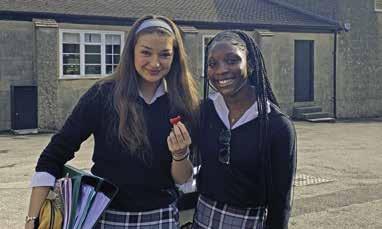
10 minute read
SOCIETIES
Abingdon Society
The Abingdon Debating Society has been around for at least 150 years, for there is written evidence that it was responsible for setting up The Raven magazine itself, the first issue of which was in 1884. This year, due to the intermittent face to face schooling, the Abingdon Inter-House Competition was splashed across the whole three terms, with one debate online with the agreement of the two teams involved, and the rest taking place in the Theatre, with the final taking place only during the very last week of the School year. Bowed, but not beaten then, by the pandemic, I would argue.
The first debate between Isabella and Smythe in the second half of the Michaelmas Term once everyone had got used to the bubbles and masks and sanitiser, was ‘This House would work from home’ and displayed a well-drilled Isabella team with plenty of statistics about the economy and commuting, up against Ambrose Mui and a last-minute second speaker from Smythe, who had a limited number of arguments that working from home would lead to isolation and job losses, and it was patriotic to go back to work. This was followed by a debate between Caverel and Barlow that it was right to be afraid, which led to a curious judging decision that occasioned far more controversy than the debate itself. The final Covid-19 inspired title of the economy being as important as people’s health, was a finely balanced battle between the girls’ Houses, with Caverel just coming out on top, 23 points to 22, with the argument swinging to and fro, around whether the economy enables health to be supported or whether health in its broadest aspect was more significant than the economy. Rosemary Capewell shone in this debate.
In the Lent Term as the second lockdown occurred, Roberts and Barlow moved online to debate whether this House would be progressive. The revelation here was Aristo Cham, who, given he is only in the Fourth Form, added a surprising gravitas to the debate between the usual suspects of Joseph Day, Barney Sharifi and Joseph Rowell, and was able to bring to bear the very real problems of an intolerant progressive authoritarianism from his experiences in Hong Kong. This one just went to Barlow and was the highest scoring debate, 24-23. Back in School in the Gasquet, Roberts then took on Smythe, successfully arguing for the benefits of authoritarian rule and (not entirely successfully) distinguishing this from totalitarianism suggesting that there could be an authoritarian democratic state, although this was a much closer debate with Sebastian Hall proving a worthy opponent on Smythe’s behalf.
Caverel then took on Roberts and won, with a debate about the merits of social media and whether it was destroying society, with Sophie Worrell and Stephanie JedyAgba proving more plausible in their arguments that social media led to the misuse of freedom of speech, the pressure of an ideal of beauty and a heightened sense of inadequacy, in spite of the attempts of Will Dewhurst and Roman Majendie to argue that it led to greater diversity and helped movements for change. Interestingly neither side seemed to criticise what for some has become mob culture, and neither side seemed to wish to define society.
Isabella and Barlow then went head to head over whether there should be a male and female Head, Barlow in the end successfully
convincing in arguing that this would not be meritocratic, but regressive and potentially conflictual, prioritising gender over merit. Moreover, what about all the other genders? Caverel Lower Sixth in the form of Stephanie Jedy-Agba and Sophia Burton overwhelmed the efforts of Smythe Fifth Formers, Artem Loparov and Matthew Stanislas, in suggesting that coping with suffering was far more meaningful than the pursuit of pleasure with some good quotations and even a little theology in this one.
The ninth debate captured something of the zeitgeist, with the title ‘This House does not miss Harry and Meghan’ and included the marvellous view expressed by Joseph Day that the couple were a ‘breath of fresh air’ for the monarchy, although this was in fact part of Roberts’ wider and even less plausible argument that Harry and Meghan would in fact save the monarchy from republicanism and that was why they were desperately missed. Too subtle for this judge anyway. Isabella did make the point in passing that potentially they were a divisive influence and not a symbol of unity, which perhaps needed further development, but had something in it.
The penultimate debate, and the last before the final, was ‘This House prefers live acoustic music’, and Smythe and Barlow circled round the definition of what ‘acoustic’ meant, Smythe trying to broaden it and Barlow trying to limit it. The important factual point that emerged seemed to be that nothing is without some electronic amplification in today’s music, but the proposition were probably attempting to broaden their definition too much.
The overall points were Barlow 90, Isabella and Roberts 88, Caverel 86 and Smythe some way behind. This meant that the three-way final on the topic of which was the greatest threat to humanity- a pandemic, Artificial Intelligence or climate change, was between the first three – with Caverel a somewhat aggrieved fourth, even though they won all but one of their debates.
The final itself was a fine event to watch, with all three teams making strong speeches and asking the more limited number of points of information allowed in the three-way debate. All were also able to argue well against the other positions as well as answering questions from the floor. Sofia Siemens and Chloe Blackmore for Isabella argued for the devastating effects to health and economy as well as human life itself from a pandemic; Joseph Rowell and Aristo Cham argued that a ‘threat to humanity’ was ultimately about the extinction of the human race, through the complete unpredictability of desire for freedom and power if the mimicking of the human mind were to become conscious, or indeed the complete lack of any morality whatsoever - ‘killer robots’ - as Roberts rather pointedly put it. Joseph Day and Barney Sharifi argued that the data for climate change was far better than the other two hypothetical threats in the future and that it was clearly the greatest threat now.
In the end only one point separated Barlow and Roberts in the decision of Miss Price and Ms Iglesias, but this year Barlow just claimed the trophy back again; doubtless the great Roberts double act, which still has one more year to run, will be back for revenge.
The best debater of the term and the final as an individual was Aristo Cham; calm under pressure, full of clear and wellinformed phrases with apparently utterly logical, compelling and authoritative arguments, he appears wise beyond his years. Quite extraordinary, and a great partner to Joseph Rowell in Barlow in Joseph’s final year.
The overall winners of the final, however, as all admitted, were the inimitable team of Joseph Day and Barney Sharifi, representing the Labour Party. This was perhaps the Cinderella of the options, and they were tireless in their speaking and points of information, with an ability to talk coherent sense without notes: no mean feat on behalf of Jeremy Corbyn. So this impressive pair from Roberts House won the long-lost Abingdon Cup which was recovered from a cellar in Smythe where it had lain untouched for a decade.
I would like to thank those colleagues who have helped judge the debates, particularly Miss Price and Dr Tapia, and Ms Iglesias who stepped in at the last minute to
ensure fair judging in the final. Both Joseph Rowell and Katharina Luetzenkirchen put in solid time as joint chairs, although at the very end, the pandemic meant that we had to rely on Stephanie Jedy-Agba to fill the gap in the final. I am greatly pleased that we managed to complete the Competition, even if other aspects of debating had to bow to the inevitable this year.
Hugh Walters Head of Theology and Head of History
Chess Club
The Chess Club has not been immune to the effects of the Covid19 pandemic. We were sadly unable to meet in person for a very long time, and the Inter-House Chess Tournament, re-established three years ago, was not able to take place in the last academic year. It is not all negative however, as the pandemic taught us to adapt and find new ways to play chess even when we found ourselves in different continents. The introduction of ChessKid.com enabled us to do just that. This platform also allowed pupils to advance their skills in the game, as many used the additional time they had during the most recent lockdown to learn some of the theory and popular strategies in chess by following the interactive lessons freely available on the site. One of the pupils who perhaps benefitted the most from this was Patryk (Fifth Form, Roberts), who did not know how to play chess before the pandemic, and is now one of our top players in the club. He did an excellent job representing Roberts House in the Inter-House Chess Tournament which took place in the Summer Term 2021. The rise of popularity of online chess also gave Jędrzej (Upper Sixth Form, Roberts) an exciting and unexpected opportunity. At the start of February 2021, he was invited to play a game of chess against Zbigniew Pakleza, a Polish Chess Grandmaster. He was one of 24 players taking part in a simultaneous exhibition.
Another way in which we adapted this year was taking chess outdoors. This was possible thanks to the generous donation from the Downside Annual Fund which allowed us to acquire a big set of chess pieces. These proved very popular from the moment they arrived at Downside, and have been put to excellent use especially on sunny afternoons. They were also used during the Inter-House Chess Tournament, which was adapted to keep year group bubbles socially distanced. Every House sent a team of three players and played each other over the course of three weeks. Barlow and Roberts emerged victorious as the two finalists, despite stiff competition from the other three Houses. The final which took place on Wednesday 23rd June consisted of three games. In the first game Luis (Fifth Form, Barlow) and Aristo (Fourth Form, Barlow) beat Patryk (Fifth Form, Roberts) to claim the first point for Barlow. It was neck and neck after the second game, as Antoni (First Form, Roberts) and Jesse (First Form, Roberts) gained a point for Roberts. This was a tight game which Leo (First Form, Barlow) and Seth (First Form, Barlow) nearly won. It was all decided in the final game between
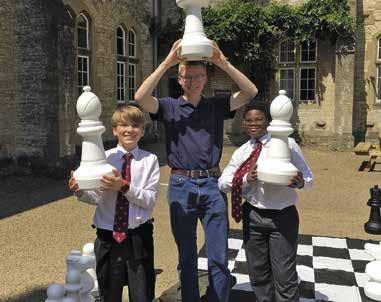
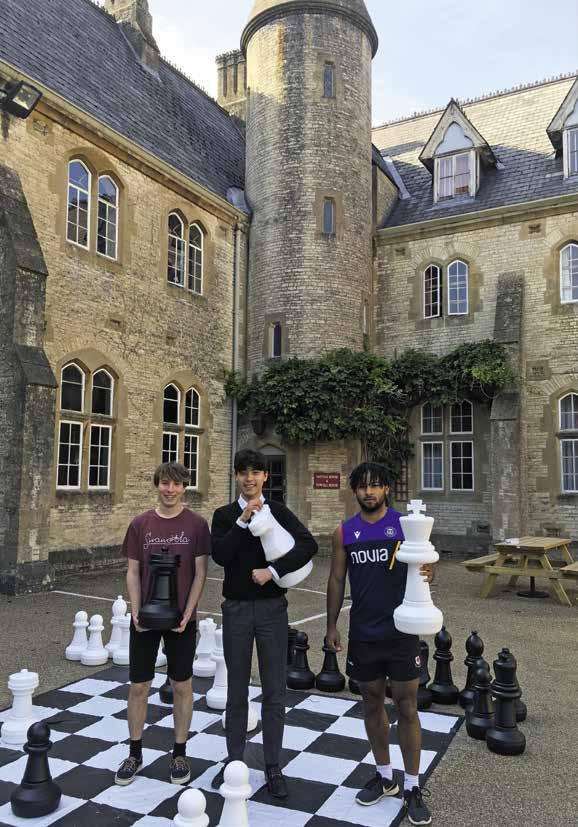
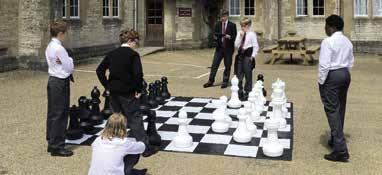
Jakub (Lower Sixth Form, Roberts), Louis (Lower Sixth Form, Roberts) and Kofi (Upper Sixth Form, Barlow). Kofi played an excellent game against the other two, and claimed the trophy for Barlow, putting an end to Smythe’s winning streak. It was a delight to see so many pupils from all different ages take part in this year’s tournament. We are hoping to build on this success in the next academic year.
Jesus Tapia Head of Mathematics and Assistant House Master of Roberts
St Francis Science Club
The newly formed St Francis Science Club started meeting in person in the Summer Term 2021. Inspired by Pope Francis’ encyclical Laudato Si’, our goal is to use STEM skills to help make the School more sustainable and reduce its carbon footprint. We have been thrilled to work with the School’s business partner, ScienceScope, who brought their expertise and sensing technology to the investigations.
In our first investigation we measured temperatures within classrooms across the School to assess user comfort levels and potential energy usage improvements. We used remote sensors and phone-based surveys to collect temperature data and user feedback data over the course of one week from eight classrooms. We then analysed the results to try to understand any problem areas for classroom comfort along with energy saving/ wastage opportunities. We also interviewed the Head of Estates to deepen our understanding of how the ancient heating system works in different areas of the School.
Finally, we presented the findings to the Mr Randall. We asked for his thoughts and ideas on how the School could improve its carbon footprint, and he provided some helpful insights into some of the School’s top-level strategy to reaching net zero.
Next academic year we will be expanding our investigations to look into boarding house temperatures and comfort, and thinking of even more ways that Downside can be sustainable.
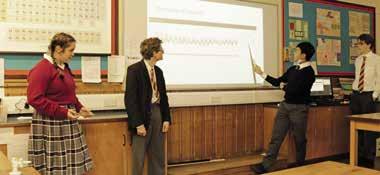
Hannah Alcántara Teacher of Biology
DOWNSIDE’S NEW SOCIETIES FOR 2021







